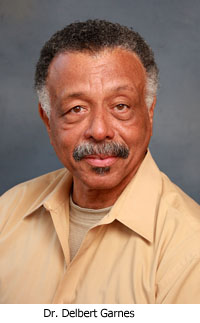Psychology courses give students a look into the mirror of self

Kesha Williams
April 02, 2012
Dr. Delbert F. Garnes, chairperson of the ECSU Department of Psychology, found a place for himself on center stage decades ago. He has returned to the stage many times as an actor in roles that intrigued and tickled him. Acting, Garnes admits, challenges you in many ways. First, it’s a remarkable task to memorize and recite the lines of fictional and non-fictional characters. Second, is using the amazing craft of facial expressions, voice inflections, body language, costumes and stage props to propel the audience to a distinct place in time.
Beyond the stage lights, Garnes teaches courses such as Abnormal Psychology and Community Psychology. In the classroom, he and students explore trends of human behavior. He explains for students the importance of role playing required years ago for the group therapy courses that were part of his master’s degree program. Garnes came to enjoy acting from that experience. Garnes also may recount a character, such as W. E. B. Du Bois, that he played last semester, "Knock Me A Kiss," with the University Players. A character illustration allows Garnes and the students to discuss the power and influence of roles people play in families, organizations, public and private segments of society. Garnes takes great pride in role he plays in the classroom.
"Teaching psychology courses allows me to provide students with a look into the mirror of self and realize human behavior, definitions of right and wrong, good and bad, normal and abnormal are up to the person who interprets it," Garnes said. "That exploration of people’s perceptions, their concepts of right and wrong is a skill that must be developed by people in many different lines of work. For that reason, many students here at ECSU can benefit from psychology courses."
While the job prospects for American psychologists working in private practice, schools, and hospitals is growing, Garnes realizes not all his students will become professional psychologists. Nor will many of them seek to become college professors, where academic research is the common thread and advanced degrees are expected.
Instead, Garnes sees students using their bachelor’s degrees in psychology to provide a host of services as law enforcement officers, owners of businesses that provide personal services and as fitness and recreation center mangers. Others use a psychology degree as a stepping stone toward earning a master’s degree in social work, where assorted career options await.
At ECSU, department faculty expect psychology majors to complete not only their coursework, but to gain a variety of additional experiences. Membership in Psi Chi, the international honor society in psychology, is an option. The organization exists for the purposes of encouraging, stimulating and maintaining excellence in scholarship and advancing the science of psychology. ECSU’s Center for Research and Evaluation engages faculty and students in environmentally oriented research efforts that address ecological issues affecting northeastern North Carolina. The student practicum, an elective course requiring 36 hours of volunteer work, also provides psychology majors with volunteer posts at local agencies, including serving as tutors or as child-care assistants in the university’s Laboratory School for preschoolers. Students also can gain experience in geriatric facilities that serve senior citizens.
"The information presented in a psychology course provides valuable knowledge in the areas of human behavior, interpersonal communication and problem-solving skills," Garnes said. "We (faculty) do all we can to provide students with the opportunity to increase their knowledge and to use it effectively. Therefore, every student should enroll in at least one course in psychology."
During his 12 years in the Department of Psychology, Garnes has been favorably impressed by the many ways the department has grown and prospered. The department can boast of faculty with talent and professional expertise in many areas within the field, including experimental, cognitive, counseling, social, animal behavior, clinical, learning, community, geriatric and educational psychology. Garnes said faculty members fully recognize the need to keep abreast of the latest developments in the field. They possess the training and sophistication required to serve a diverse population of students.
"Faculty in the Department of Psychology demonstrate and maintain a strong potential to do good and to prepare our students for the highly technical and global environment," he said. "Their knowledge and skills will well prepare our graduates for the competition for current and future jobs."
This article is part of a series of features spotlighting the chairpersons of ECSU’s academic departments.

